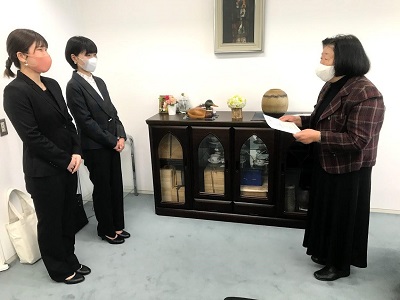
3rd year students, Maho Kawai and Mami Kumei receiving 36th UNU Global Seminar participation certificates from President Tsuda in April.
Last March, two Seishin students were invited to participate in United Nations University’s 36th Global Seminar. Roughly sixty students from prestigious universities in Japan and overseas participated. Seishin was invited in recognition for its efforts to reduce the Gender Gap in Japan (SDG5).
Maho Kawai and Mami Kumei from the Department of English Language and Literature were recommended based on their overall English ability and leadership skills. And since the topic of the UNU event was Climate Change, it would help them prepare for the upcoming Japan University English Model United Nations (JUEMUN) where they will be serving as official Chairs of the event. After the UNU Conference, I asked Maho and Mami for their reflections on the experience. Here is what they had to say:
Mami
The main topic we discussed was environmental sustainability problems. About 60 people participated. Some of them were from UN uni or Keio or Todai. So there were many smart students who were really interested in global issues. At first we were given a lecture about environmental sustainability problems related to air, water and land. And then we were divided into 3 groups. Each group was expected to make a presentation through their discussion.
To have a wider and deeper discussion, we were divided again into 3 sub groups, which were the air team, water team and the land team. And in each sub group, there were 6 or 7 people. In my group, 5 out of 7 members were not Japanese and from places like Thailand, the Philippines, China, Nepal. I think the same is true of every other sub group. So the seminar was very International.
The most difficult thing I faced was that I couldn't clearly understand what people were saying because all of them had different accents and pronunciation. I faced some unfamiliar strong accents, and they spoke very fast, so it was super hard for me to get all of what they wanted to say. But I guess they felt exactly the same thing about me, too. It was a good opportunity for me. I could experience International conversation even in Japan and even in my house.
What I learned is that the most important thing is to know about the world we are living in.
In the UNU global seminar, we mainly discussed environmental sustainability problems and possible solutions to each problem. Whenever we think about the solutions, no solutions can be done by one person or a few people. We need lots of people to make a big change. So, we need to involve as many stakeholders as possible.
Then, who are the stakeholders? Governments, local communities, the UN, NGOs, companies, of course they all can be the stakeholders. However I think the most important stakeholder is the individuals, I mean, every single person. Of course the governments or the local governments have more power, and asking them could be a way to make a change, but that would not be realistic because they have their own priorities and limitations. So, we need to have power and a loud voice to take some big actions on environmental sustainability problems.
We need to motivate more and more people. But without knowing what is happening around the world right now, people can’t have motivation. For example, in Japan, how many people are caring about the world? For example, in almost all of the supermarkets or convenience stores, plastic bags are no longer free. But how many people are bringing their own shopping bags? And why? I work at a drugstore and many people started to bring their own bags. But most people do that just because they don’t want to pay money. Or just because the government decided. People just follow the rule without really knowing the reason why they should do that. But will it really help solve the problems? No. We need to raise our awareness.
We, especially the young generation need to educate ourselves as well as the people around us, and we need to take the environmental sustainability problems really seriously because we will be responsible for the future generation. Therefore, knowing about the world and the problems is the very first step to actually take actions and solve the problems. I was deeply impressed and inspired by other participants who were almost the same age as me. They all were really eager to actually do something for our planet because they all noticed that the conditions will just get worse and worse and we won’t be able to recover them if we don’t take any action NOW.
Maho
I learned a lot from attending this seminar. Talking with people of the same age inspired me to be highly conscious. In addition, since we had discussions with people of different nationalities and majors, each of us analyzed the problem [of climate change] from a perspective.
Even though I talk to native teachers at our school, I had never had a chance to talk to native people of my age, so it was a great opportunity. There are many intonations and tones that I can't hear, and I wondered how English could change so much depending on the background of the person who speaks it.
Also this time, this seminar was held via Zoom, so I was worried about participating while alone in front of my computer, but there were people from the Philippines, African countries and so on. So this was great that we could discuss with people all over the world with one computer! I was impressed by the progress of technology, but as technology advances dramatically and globalization progresses, environmental problems and racial discrimination problems also become more prominent. I strongly wanted to keep an eye on the problems and work with young people around the world to solve them.
・Thomas Fast准教授
・英語英文学科
・英語英文学科ブログ



